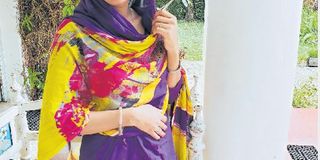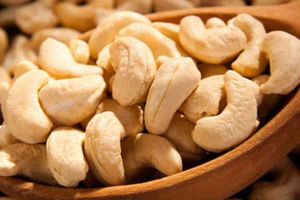Being Alaa: Why every woman can relate to this freedom heroine

Alaa Salah, Sudan’s freedom heroine
What’s the first thing you’d tell a woman who has been an icon, symbol of one of greatest revolutions the world has seen if you ever came across her? This is what kept me awake the night before I was going to meet Alaa Salah, Sudan’s freedom heroine who helped fuel the revolution that ousted President Omar al-Bashir from power. She became a symbol who represented thousands of Sudanese women who took part in pre-democracy protests on the streets of Sudan for freedom from an authoritarian rule.
In April last year, a young lady with her golden sneakers and white toub jumped on top of a white car, raising her arm and leading a crowd of protesters with her chants and poems. This image of the young protestor went viral on social media that attracted local and international headlines and brought Sudan’s revolution on the spotlight.
That image of a powerful lady liberty is all I had in mind. I had my lines rehearsed and I was ready to face a woman who fuelled a change, a revolution for her native country.
But there she was, casually seated adjusting her earing in front of a mirror that complimented her purple and yellow attire so well. What was extraordinary about her is that the woman who stole the headlines in2019 was so down to earth, welcoming and ordinary, just like any one of us. I came to realise that she is just an ordinary young lady who was inspired by her people’s struggle to have the courage to take the risk, not for any other big cause but to enjoy the basic rights and freedom that some of us take for granted.
22-year-old Alaa grew up in Khartoum and was raised in an ordinary middle-class family, far away from the hustle and bustle of politics. Her mother is a designer and her father an entrepreneur. In her statement at the UN Security Council Open Debate on Women, Peace and Security, she says her journey represents a long line of Sudanese women who have fought for peace and justice in our communities for decades, well before she arrived at this important moment in the future of Sudan. “I wouldn’t be here without them,” she adds.
She had more to share with Woman Magazine: Excerpts from the interview:
I think everyone knows Alaa from the picture. But who was Alaa before this – what prompted you to jump on the car at the first place?
Before the revolution, I was a student of architectural engineering. As I would walk to University every day and see my fellow citizens around me, struggling to get food and medicine, half of the country living in poverty, how could one not become political? In December 2018, our fight for bread became a fight for our freedom. And that’s when I became active in human rights projects and worked with different student-led unions.
There you were singing Thawra on the roof of a white car fighting on behalf of thousands of Sudanese women and youth for a change, here you are a symbol of revolution having girls named after you. What has changed after that picture?
When you see thousands of ordinary women and men of Sudan left their homes, their schools and their daily work to take to the streets, to face bullets and teargas, who risked their lives and their livelihoods to demand an end to dictatorship, you’ll realise that I played a small part. Of course, a large part of my life has changed since that day. From that day on, my role became more towards striving for peace and freedom for my country. My responsibility became largely to push forward the message of our revolution to the world. But through it all, I believed that I was able to carry that message since God only weighs people with what they can handle, nothing more and nothing less.
Are you the only daughter? Is your family supportive of your choices?
I am not the only child. I have sisters and brothers. My entire family was always supportive of my role in the revolution but just like any parent, mine were worried too. Especially because the situation was not safe for me, back then. But that didn’t stop them from coming out on the streets with me because everyone believed that the time for change had come.
Did you get to finish your architectural studies?
In 2019, my education came to a halt. There was a court case and an appeal to stop our education. We decided to fashion a slogan that said, “There will be no education during hard times” and “We won’t reap the benefit of receiving education on the blood of those who work hard for our freedom.” I have decided to resume my studies and I am currently in my 3rd year of architectural engineering.
Why is it important for you to be here today?
When Baba Josina [opposition leader, Zitto Kabwe] got in touch with me and informed me about his and Anna’s decision to name their second-born after me, I was excited and honoured.
It’s a big deal for me. I knew from then on I wanted to meet baby Alaa and I was excited to visit Tanzania, my namesake and it was a good time to come and meet family.
I would like to requote you during your singing protest: ‘The bullet doesn’t kill. What kills is the silence of the people’ – this is powerful. How can people channel their fear to voicing out their rights in a country/world where opinions and voices are seen as criticism and where criticism is punishable by law and where freedom of speech is repressed?
In Sudan, our voices were being silenced and there were laws that were oppressing and punishing us. But we reached a point where enough was enough. This culminated in the 2019 revolution after being oppressed since 1989. We believe that 30 years of oppression is enough! We were faced with the possibility of being beaten and even killed. But none of that stopped us from our plight for justice.
Women have taken extraordinary courage to fight for basic rights—to wear trousers, to leave their hair uncovered, to voice their opinions on social media without fear, or to share a meal with male friends—all of which were criminalized by the former regime’s public order laws.
Every time we went back home, we were further encouraged to go back onto the streets and continue revolting until our rights and demands were met. I always say that as long as one comes forward in truth, there is no need to be afraid of voicing the wrong doings. In saying so, I believe that every dictatorship is afraid of the power of the truth.
Sudan after Bashir, 10 months later, what has changed on the streets for women?
After the fall of al-Bashir, the situation changed a lot. We now express our opinions without fear or obstacles. Sudan is now in a transitional phase that started on August 17 last year and will last for three years. The government is now made up of civilians and the military.
Last month, the Law on Public Order, which was restricting women’s freedom, was abolished and very important decisions were issued in Sudan, including the dismantling of the National Congress Party of the ousted Omar al-Bashir.
We are fully aware that what has been sabotaged in 30 years cannot be repaired in 3 years, and that there are real challenges in the transition.
But we are confident that with our work and our unity, we can get Sudan to safety. We are building the Sudan we dream of, a democratic Sudan. And that we work to achieve the slogan of our revolution on the grounds of freedom, peace and justice.
Sudanese women leading a change, a political transformation were one of the greatest defining moments of 2019. You showed the world how it’s done. But in one of the articles published in Time, you were quoted saying ‘women are being excluded as Sudan struggles to form a democratic government’ and that you and other women are being side-lined. Why so?
After the great role that women in Sudan played, and despite the sacrifices they made, they were sidelined in the negotiating table. Given women’s pivotal role in working towards peace and development, in the promotion of human rights, and in providing humanitarian assistance to communities in need, there is no excuse for us not to have an equal seat at every single table.
But women in Sudan didn’t give up. They worked on a number of advocacy campaigns to include the woman’s voice at the negotiating table.
And including them in the formation of the government by at least 50 per cent, not only include them as a percentage, but must be placed in areas of influence and decision-making areas. Because a woman is ‘peace’.
Now there are 4 women ministers. We hope for more during the coming period.
When you picture your home, an ideal Sudan, what is that you see – would like to see it as?
We dream of a democratic Sudan. A place where everyone breathes freedom, peace and justice. And that there are no wars after today in Sudan.
A place where its citizens finds all the basic rights in place, from health and education to decent life. Sudan was once called ‘the food basket of the world’ because of its bounties, we hope that the basket will be filled again.
If you had the super power to change something right now, anywhere in the world, what would it be and why?
I wish this was true. If it were, I will end wars from the world, because war breeds poverty, ignorance and diseases. People become displaced from their villages or refugees to other countries.
I will spread peace in the world to get rid from the scourge of wars and their suffering, from loss, deprivation and shame.
What I am working on right now is education. I believe that education is the foundation of society. We in schools raise future generations.
No child, especially a girl should be deprived to study, this includes a woman or a mother to be able to continue studying from where she left off. An educated mother equals an educated society.
What next for Alaa? What headlines are we expecting this 2020?
A year of change by achieving a lot. I do have a lot on my mind on what I want to do, but everything has its time. Slowly but surely.




